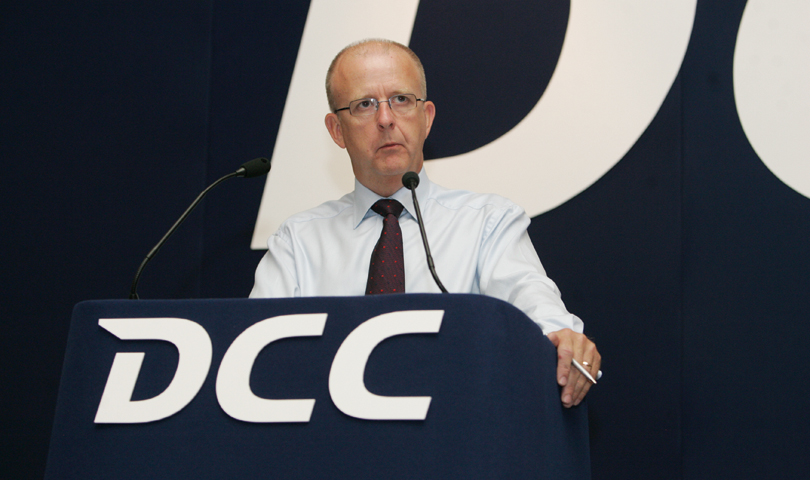It’s funny how with some shares a price surge seems obvious in retrospect. Take DCC plc, the fuel supply, technology and healthcare conglomerate that is traded on the London Stock Exchange after quitting the Dublin exchange a few years ago. Through most of 2014, the share was trundling along at the £35 level. Then last winter Mario Draghi announced the ECB’s financial repression measures to drive interest rates to the floor. Investors sought out plcs that deliver cash dividends, and DCC ticks that box, with a 20-year record of consecutive dividend growth.
The DCC share closed 2014 at a price point of £35.50. With a dividend of around 85p on the cards for the financial year ending March 2015, the prospective yield was 2.4%. So institutions piled in, driving the price up by 35% between January and May, up to the £48 level. Towards the end of May, the stock climbed further to £51, even after the company sold 4.2 million new shares at £47 per share.
That share issue relates to the other factor behind DCC’s popularity, the company’s biggest ever takeover deal. DCC is paying £338m (€464m) to buy Butagaz from Shell. Butagaz is a long-established brand and is the number two company in the French LPG market, with a share of 25%. Analyst Allan Smylie at Davy reckons that the deal will add 20% to DCC’s annual earnings.
'Astounding'
Davy acts as stockbroker to DCC and even Smylie must be surprised at what’s happened with the share. In October 2014, he penned a detailed note on the company, drawing favourable conclusions and setting a price target of £40. The essence of Smylie’s thesis was that DCC could come back into vogue if it stepped up acquisition activity. He observed that the group’s underlying earnings doubled every four to five years since its IPO in 1994 through to 2009, a track record Smylie described as “astounding”.
In the subsequent five years, the cumulative earnings growth slowed to 26%, “not bad but relatively pedestrian versus the group’s history”. The question for investors was whether Tommy Breen, who took over as chief executive in May 2008, had the same takeover hunger as his predecessor, Jim Flavin. DCC kept buying under Breen, with an outlay of £535m from 2009 to 2014, but in the core business of energy distribution the margins are so small that it takes a lot of new volume to grow profits.
The Butagaz deal is a step change in DCC’s acquisition approach. The group’s involvement in distribution of energy products goes back the early 1990s, when it got involved with Flogas and Emo Oil in Ireland. Between 1993 and 2014, there were 38 deals in Ireland, the UK and continental Europe. Terms for ten of the acquisitions were not disclosed, but of the 28 large deals where consideration was revealed, the total outlay over two decades was in the region of £640m. In that context, the outlay for Butagaz marks something of a strategic shift.
Four Divisions
After disposing of its food and drinks unit last year, DCC has four divisions. Energy is the biggest, accounting for three-quarters of the group’s £10.6bn turnover. This is a very low margin business, with the unit delivering 54% of operating profit. The other three divisions – technology, healthcare and environmental – contribute 46% of the profit on 28% of the turnover.
Distribution of heating oil and motor fuels is highly fragmented. In the western European fuel distribution market, DCC is active in ten countries, with market leadership in seven, but its market share across Europe is only 2.8%. In the UK, there are thousands of distributors in oil wholesale, with the number two and three players having under 4% market share, according to Smylie. While such fragmentation offers consolidation opportunities, mature oil fuel markets are ex-growth, barriers to entry are low and pricing is determined by global commodity prices.
The fundamentals of LPG, or liquefied petroleum gas, are more attractive. LPG is enjoying organic growth in Europe, and because of the high capital investment required most markets have a handful of main players. Profit margins are better than in oil fuels too; Smylie estimates that 38% of profit in DCC’s energy activities flows from LPG, which in volume terms accounts for 13% of throughput.
Ramping Up LPG
So Breen and his board are ramping up in an LPG direction. They needed to do something because DCC’s outturn in 2014/15 was lacklustre. Due to falling oil prices, group turnover decline by 4%. Pre-tax profit after ‘exceptionals’, excluding the discontinued foods business, was marginally down year-on-year. The 17% growth in earning per share of 171p was wholly attributable to the £16m gain booked on the disposal of Robert Roberts and a £8m reduction in the tax charge.
At the £51 level, DCC’s share price is currently trading on a historic p/e 30. Factor in the 20% earnings uplift that Smylie believes will accrue from Butagaz, and the forward p/e in the current year reduces to 25. As for the yield attraction, that’s down to around 1.8%, though now the share carries heightened risk of capital loss.
The vibe from DCC is that there isn’t much execution risk with its big French buy. Ahead of the placement, the company told shareholders: “Butagaz has an experienced and ambitious management team which has a track record of delivering strong profit growth. Butagaz currently operates as an independent standalone subsidiary of Shell, with its own sales, marketing, procurement and planning functions and IT, finance and back office systems. As DCC has no LPG operations in France, Butagaz will continue to operate as a separate subsidiary under the leadership of its existing management team.”
Under French law, DCC has to consult the Works Councils that represent Butagaz’s 550 staff, a process that is expected to conclude in the final quarter of 2015. Things move slowly in France: DCC’s €106m acquisition of French motorway unmanned petrol stations, announced in August 2014, still isn’t over the line.









